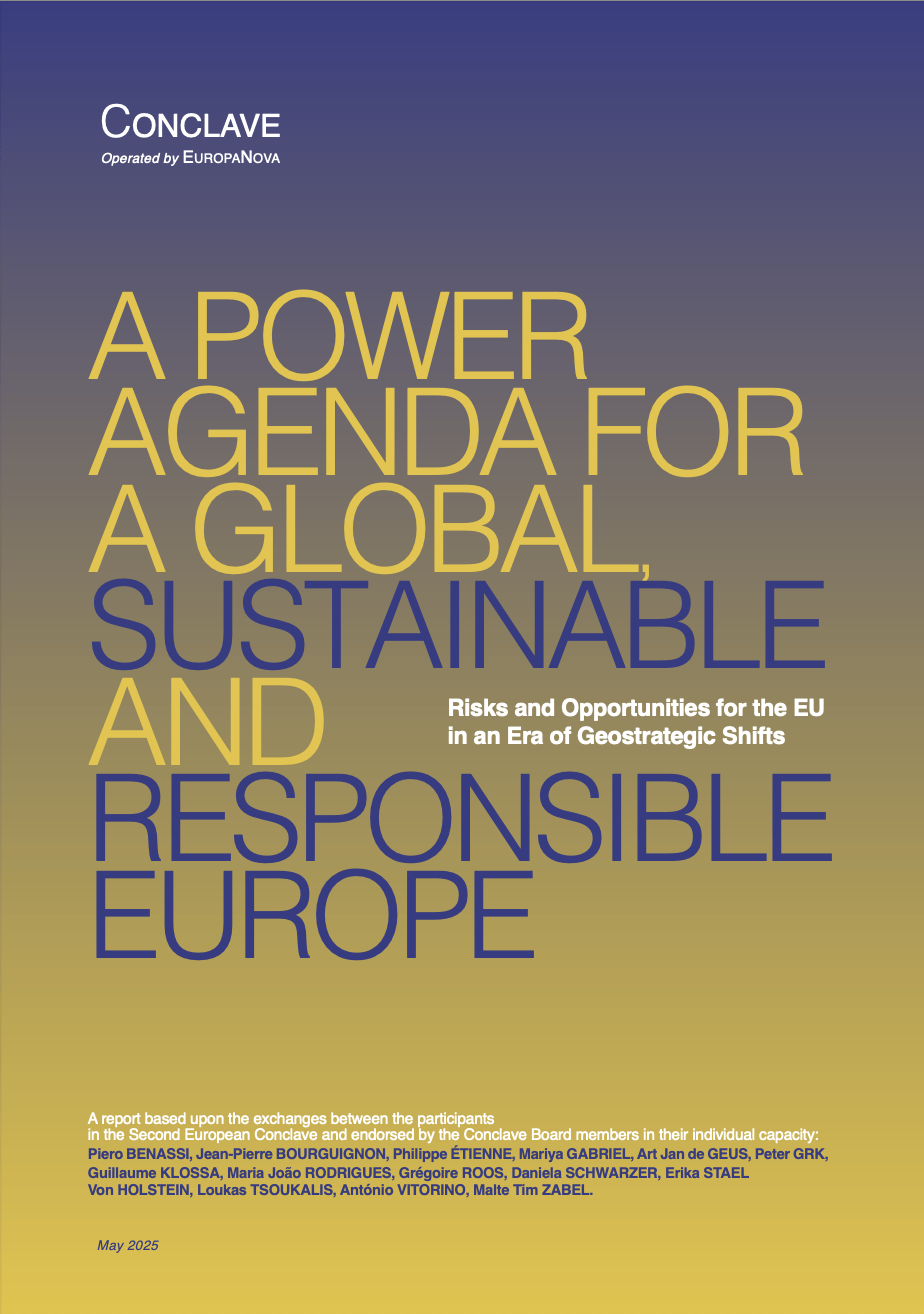In an era defined by geopolitical shifts, technological competition and democratic challenges, the European Union has the opportunity to shape its own future. The Conclave 2025 report outlines an ambitious Power Agenda based on four strategic pillars: strengthening autonomous security and defence; advancing technological and industrial leadership; ensuring sustainable financial capacity; and revitalising European democracy through citizen engagement. It puts forward concrete recommendations to help the EU meet growing expectations.
Europe’s wake-up call
Donald Trump’s return to the US presidency and Russia’s continued aggression against Ukraine have ushered in a new phase of global uncertainty. For Europe, this is more than a strategic concern. It is a moment to reaffirm its role in the world – or risk becoming increasingly sidelined.
The 2025 Conclave, a high level gathering of European leaders, thinkers and civil society representatives, co-initiated by the Bertelsmann Stiftung, delivered a clear message: Europe should aim to realise its full potential, becoming more proactive, more resilient and more effective. This transformation depends on unity, strategic investment and a citizen-driven vision for the future.
A geopolitical agenda built on strategic partnerships
Europe can no longer take a stable transatlantic relationship for granted. The report recommends stepping up efforts to reinforce European security, including increased defence spending and stronger institutional ties with the United Kingdom. This should be accompanied by a more robust European pillar within NATO and establishing fast-track procurement mechanisms for defence innovation.
At the same time, Europe is encouraged to diversify its partnerships beyond traditional allies. Strengthened economic and diplomatic relations with the Global South, India, ASEAN, Latin America, and democratic partners, such as Japan and Canada are essential. These alliances should be grounded in a compelling European offer to leverage the Single Market and promote high standards in areas such as climate, labour and digital governance.
Technology and industrial policy as drivers of global influence
Scientific excellence and innovation are essential to Europe’s global relevance. While the EU boasts strong research capacities, it still lacks the scale and coordination required to compete globally. To counter the brain drain and attract top talent, the report suggests launching ambitious “moon-shot” research initiatives and introducing a universal talent visa for highly skilled professionals.
A modern industrial policy would look beyond supporting legacy sectors. Europe is encouraged to focus on mission-driven innovation in areas such as AI, clean energy, mobility and pharmaceuticals. And this needs to be underpinned by reformed financial rules and a DARPA-style European Innovation Council. Strategic use of public procurement and smart regulation could help develop “Airbus-level” industrial champions.
Additionally, Europe should build its own technological infrastructures in key fields such as AI, cloud computing and quantum technologies. Proposals include investment in AI giga-factories, the creation of a TechEU Scale-Up Fund and the development of a European Tech Stack (EuroStack) to strengthen competitiveness vis-à-vis the US and China.
Financing Europe’s strategic vision
Strategic autonomy depends on robust financial foundations. Without sufficient resources, the EU will struggle to deliver on priorities, including defence, the green transition and digital sovereignty. The report outlines several options for reforming the EU’s financial architecture:
- Revising the Stability and Growth Pact (SGP) for greater national investments in security;
- Enabling joint borrowing for defence and digital infrastructure, modelled on the NextGenEU programme;
- Introducing EU-level revenue instruments, such as digital levies, carbon border taxes or financial transaction taxes;
- Completing the Capital Markets Union to unlock private savings across the bloc.
These measures aim to equip the EU with the necessary financial tools to act with greater decisiveness – while maintaining fairness among member states.
Strengthening democratic foundations through citizen engagement
The success of these efforts will depend on public support. The report emphasises the importance of engaging European citizens not as bystanders, but as co-creators of a stronger Europe. Key proposals include institutionalising regular citizen assemblies, launching a continent-wide civic education initiative and establishing a European Media Grid to protect the information space from disinformation and undue concentration of power.
Equally important is the development of a unifying narrative for Europe – one that is grounded in shared values, such as openness, solidarity, innovation and sustainability. Local initiatives, cultural exchange and transparent decision-making processes can help bring the EU closer to its citizens.
A call to action
The Conclave’s assessment is clear: Europe stands at a crossroads. A lack of strategic resolve, industrial stagnation and waning public trust risk undermining its global standing. But the EU possesses immense potential in its research institutions, democratic traditions, cultural richness and economic base.
To harness this potential, the EU is encouraged to act with greater boldness, clarity and cohesion. A more capable and confident Europe is not only essential for its own citizens. It also sends a powerful signal to the world that democracy, the rule of law and international cooperation remain vital forces for progress.
Download the report here.
About the author
Malte Zabel is Co-Director of the Bertelsmann Stiftung’s Europe’s Future Program, which pursues projects on geopolitics and security, economy and transformation, and European public opinion.




Kommentar schreiben